In the fast-paced, technology-driven world we live in, digital assistants have become an integral part of our daily lives. From Siri to Alexa and Google Assistant, these AI-powered helpers have made tasks easier, information more accessible, and our lives more efficient. However, their full potential has yet to be realized, and there are exciting possibilities ahead. Digital assistants have come a long way since their inception, evolving from basic voice recognition systems to sophisticated AI companions capable of understanding context and natural language. They have been primarily used for simple tasks like setting alarms, answering trivia questions, or playing music. While these functions are undoubtedly convenient, they represent just the tip of the iceberg when it comes to what digital assistants can do for us. One area where digital assistants can excel is in personal productivity. Imagine having an AI-driven personal secretary that not only schedules appointments but also optimizes your calendar for maximum efficiency. It could consider traffic, weather, and your energy levels to suggest the best time for meetings and errands.

With access to your emails and documents, it could draft responses and gather information for upcoming meetings, saving you precious time and mental energy. Moreover, digital assistants can be powerful tools for lifelong learning and self-improvement. They can curate personalized content recommendations based on your interests, track your progress in online courses, and even quiz you on important information to reinforce your learning. With their vast knowledge base, they can answer complex questions and engage in informative discussions, helping users expand their horizons. Health and wellness are also areas where digital assistants can play a transformative role. They can monitor your daily habits, from diet to exercise, and provide real-time feedback and suggestions for improvement. For individuals with chronic conditions, these assistants can serve as a virtual caregiver, reminding them to take medication, tracking vital signs, and alerting healthcare professionals in case of emergencies. Furthermore, digital assistants can enhance our social lives and connections. They can help organize gatherings, suggest activities based on your interests, and even facilitate language translation during conversations with people from different backgrounds.
As virtual companions, they can provide companionship and support for individuals who may feel isolated or lonely. In the workplace, digital assistants can streamline tasks and boost productivity. They can assist with research, data analysis, and report generation, allowing employees to focus on more creative and strategic aspects of their jobs. With their ability to transcribe and summarize meetings, they ensure that valuable information is not lost and can be easily shared with team members. Privacy and security concerns are natural when considering the integration of digital assistants into every aspect of our lives and click here now http://www.thesamet.com/blog/2006/12/04/django-like-filters-for-kid/. However, advancements in AI and increased awareness of these issues have led to robust privacy controls and secure data storage solutions. Users can now have greater control over what information their digital assistants have access to and can opt for end-to-end encryption for sensitive interactions. To unleash the full potential of digital assistants in everyday life, we must continue to invest in AI research and development. These systems need to become even more adept at understanding context, emotions, and human nuances.

